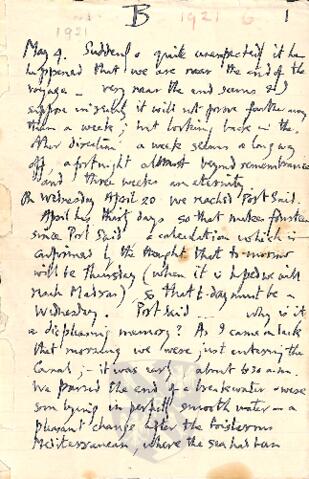Área de identidad
Código de referencia
Título
Fecha(s)
- 4 May 1921 (Creación)
Nivel de descripción
Volumen y soporte
1 item, paper
Área de contexto
Nombre del productor
Historia archivística
Área de contenido y estructura
Alcance y contenido
Brief Summary
Diary entry written on 4 May in which he describes recent events on board the S.S. Sardinia on the voyage from England to India. On 20 April they reached Port Said and travelled along the Suez Canal before entering the Red Sea and sailing towards India.
Detailed Summary
The Suez Canal was perfectly smooth which was a pleasant change after the boisterness Mediterranean. He was surprised to see ships prouder than them including a Japanese battleship. At Port Said the quayside was very smart and more like a sea-front than the sort of place where vessels were tied up in an English port with it’s background of warehouses. The scene was gay and impressive but did not make his heart rejoice. A few Egyptian men had a very graceful way of rowing - they stood up in the boat and faced the bows. He had spent two hours onshore at Port Said.
He had imagined the Suez Canal to be very big, about as wide as the Thames at Westminster, with a continuous stream of great ships moving in either direction, all under a blazing hot sun and deep blue sky between unbroken banks of yellow sand. But the canal wasn't very wide and there was a dull, almost grey atmosphere on the day they went through. He describes the housing along the banks of the Canal, as well as the landscape and towing path.
There were reminders of the recent war with a vast quantity of war material collected together in a camp which stretched several miles along the bank. There were signs of activity but the whole appearance of the vast dump was indescribably desolate.
He had been warned about the heat in the Red Sea. The weather was humid, the sky was overcast and the atmosphere very moist. He was surprised by the lowering and gloomy aspect of the clouds which the Captain said contained sand which was often blown to a great height and they were leaving a sand storm behind them which was a fortunate escape.
He could see small islands which rose very abruptly from the water. Their geological origin must be volcanic, they were very bare and rocky.
They spent three hours in Aden. The people there wore fewer clothes, especially the little boys of whom a great number approached him and his companion. On the verandah of a large hotel he saw a single man pulling on a rope which worked a ‘punkah’ [a series of rectangular sails about 4 ft x 2 ft hanging from a frame] with a flapping motion. It was a pleasure to walk a mile or so on land.
On entering the Indian Ocean the change was immediately perceptible. There was a long gentle swell and for six days the ship was heaving. The heat was mild as they approached Ceylon.
He saw monsoon clouds for the first time and expected bad weather. What particularly interested him in observing these clouds was the effect of the immense size in the whole arch of the sky which he compared to the Fenlands in England. The sky in the Indian Ocean was vaster than any he had seen at home.
They entered the harbour of Colombo which, unlike Port Said had an air of modesty. Long low red and yellow houses could be seen through the trees. Colombo, looked at from the harbour, was like a town that happened in a forest and from the inside it looked like a town lying in a garden.
He could see forests which were were moist and brilliant green. The various palm trees which predominated were garden rather than forest trees. He describes the trees, shrubs, and flowers he’s observed, mentioning Poinciana Regina, which flowered very freely with a cluster of brilliant scarlet blossoms, the temple tree, and a hibiscus, which was used as everybody’s garden hedge and had a large scarlet like flower. Many trees had red or yellow blooms and the air was laden with their heavy scent.
He spent an enjoyable time in Colombo with Captain Forbes. They met an acquaintance of Captain Forbes and drank brandy and ginger ale together before being joined by another Englishman.
He took a car to Mount Lavinia which was a moving experience as that was the first time he had seen the East.
He will write more about the East in another chapter. The S.S. Sardinia had to hurry up and get to Calcutta. No more economy of coal. Tomorrow they should be in Madras and on the 10th in Calcutta - five days sooner than the Captain estimated.
The diary entry ends as they were steaming up to the Bay of Bengal.
